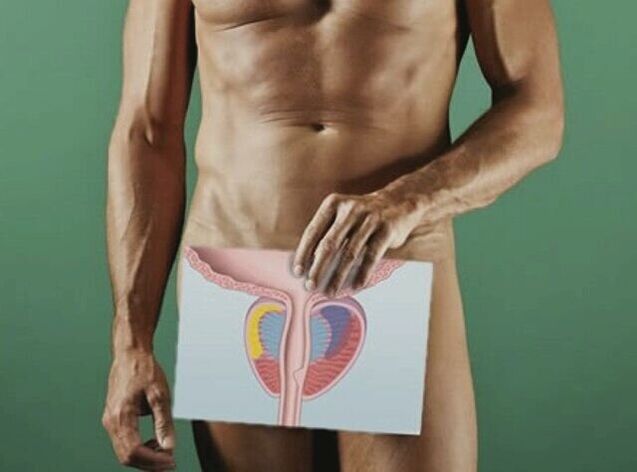
The term "prostatitis (microbial code 10 - 41)" refers to inflammatory processes that occur in the tissues of the prostate gland and cause pain, difficulty urinating, frequent urge to go to the toilet, decreased libido. According to various statistics, the disease mainly affects men of reproductive age, ie from twenty-five to fifty years. Depending on the characteristics of the symptom complex and the degree of damage to the gland, there are two forms of prostatitis - acute and chronic.
According to MCB coding, chronic prostatitis is rated 41. 1, and acute form 41. 0 is used. The initial diagnosis is made by visual examination of the patient and the study of anamnesis. Additional methods are used for confirmation: ultrasound and laboratory methods.
General features and classification
One in three members of the stronger half of the population knows what prostatitis is, as it is caused by inflammation of the prostate gland, which is one of the most common pathologies of the male genitalia. The disease manifests itself with characteristic symptoms: pain, burning sensation, aggravated by the act of urination, decreased sexual activity, the desire to go to the toilet more often.
In men, prostatitis is the result of the defeat of the prostate by infectious agents that penetrate its tissues through the reproductive organs or systemic circulation. Even causes such as colds or bronchitis can cause an inflammatory process. This often occurs against the background of factors that are conducive to the spread of infection, among which is primarily called weakened immunity.
In order to obtain average values, there is a statistical coding of prostatitis mkb 10, which allows an objective assessment of the situation with the incidence of the male half of the population. Chronic prostatitis mkb 10 has a code of 41. 1, which is assigned to a disease that lasts six months or more. In addition, the international code classification ICB 10 xp characterizes this form of prostatitis as difficult to treat.
The code for acute prostatitis mkb 10 is defined slightly differently - 41. 0. This form of the disease is recognized as a good treatment used and continues against the background of overt symptoms of the disease. 41. There are also 2 codes. This indicator is common to diagnose a disease associated with prostate abscess. It is important to know that a man diagnosed with chronic prostatitis is advised to seek treatment at least once every six months and to see a specialist regularly.
Predisposing factors
The likelihood of acute and chronic prostatitis in men increases significantly against the background of the negative impact of predisposing factors. The following causes can be a kind of catalyst for inflammatory processes affecting the tissues of the prostate gland:
- Sedentary lifestyle, low sexual activity, stagnation on the background of excess weight, characterized by impaired blood flow.
- Systemic hypothermia of the body, for example, stems from the characteristics of the work.
- Injuries, regardless of their nature and time of injury.
- Infectious, viral diseases of the genital area, including sexually transmitted diseases.
- Infectious and inflammatory diseases of other systems and organs, such as bronchitis, purulent tonsillitis and a number of others.
As an additional predisposing factor, practical medicine also refers to digestive problems expressed by the appearance of systemic constipation. Thus, an inappropriate approach to nutrition can also indirectly affect the occurrence of inflammation of the prostate gland.
It is important! Timely elimination or reduction of the effects of adverse factors is the most reasonable and effective way to prevent prostatitis in men.
Clinical picture
Most people probably know what prostatitis is in different forms. However, not everyone knows that the classic symptoms of this unpleasant disease can vary significantly depending on the stage and form of the pathology:
- Catarrhal prostatitis. The disease is characterized by the appearance of pain in the perineum, groin, often the desire to go to the toilet.
- Follicular prostatitis. The pain syndrome worsens, there are problems with urination, there may be a false desire to go to the toilet.
- Parenchymal prostatitis. Severe pain syndrome is aggravated by the act of urination or defecation, often there is a delay in urine flow, a false urge to go to the toilet, fever, chills, weakness, fatigue.
The course of chronic prostatitis is accompanied by the appearance of almost all of the symptoms listed above, but the symptoms are more chronic. It should be noted that against the background of exacerbation of the chronic form of the disease is very rare. This form of the disease develops gradually in men under the influence of inflammatory processes caused by infectious damage to the tissues of the prostate gland. Its main symptoms are:

- Dysuric syndrome. Against the background of the negative effects of inflammatory processes, the volume of the prostate gland increases significantly and causes compression of the ureter. This is the main reason for the urge to urinate frequently, including pathological, false, painful feelings.
- Pain syndrome. The prostate itself is devoid of nerve endings, and pain in prostatitis is the result of the spread of inflammatory processes and damage to the nerve fibers of the pelvic organs adjacent to the prostate gland.
- Sexual dysfunctions. Diseases of the prostate gland are characterized by the appearance of various sexual disorders. Most men complain of a decrease in the intensity and intensity of sensations during sexual intercourse, a decrease in libido and the absence of an erection in the early stages of the disease. Impotence is characteristic of advanced forms of pathology.
You should know that the development of prostatitis is often accompanied by disturbances in the psycho-emotional background of the patient. The man becomes more nervous, the development of depressive states, nervous breakdowns are possible.
Prostatitis is associated with a characteristic clinical picture that greatly facilitates timely diagnosis. The main diagnostic methods are manual rectal examination by an expert, ultrasound examination, as well as collection of urine and prostate secretions for analysis in the laboratory.
Methods of treatment
How to treat prostatitis, which methods are most suitable in a particular clinical situation, is determined only by the attending physician, based on the results of the study, the physiological characteristics of the patient, the form and stage of development of the disease. Complex therapies are often used, including medications, physiotherapy, folk remedies, and dietary adjustments.
Treatment of chronic form
Chronic prostatitis is a particularly unpleasant disease, the treatment of which is fraught with a number of problems and difficulties, it is almost impossible to completely eliminate the disease. However, the use of competent therapy will allow to achieve long-term and stable remission, as well as to eliminate the main symptoms of the disease and significantly improve the quality of life. The main treatments are:
- Treatment. The choice of drugs is made according to a scheme developed individually by a specialist, mainly using antibacterial and anti-inflammatory drugs. The use of painkillers is allowed to relieve pain in the early stages of treatment.
- Physiotherapy. In addition to drugs, physiotherapy methods are used to stimulate regenerative processes and increase the effectiveness of the active components of drugs, such as laser therapy, magnetotherapy, electrophoresis.
- Massage. Regardless of the form and stage, one of the most effective methods in the treatment of prostatitis is prostate massage. The procedure helps to eliminate inflammation, stagnation and pain. Massage, as a rule, is performed by a specialist in a medical institution, but it is allowed to perform it yourself at home, subject to the mandatory mastery of medical equipment.
- Immunomodulatory therapy. Treatment of chronic prostatitis involves the mandatory use of immunomodulatory drugs that increase the immune system and overall body tone. The choice of medication to eliminate this unpleasant disease should be based on the prescriptions of the attending physician.
In addition, treatment ensures that the patient is forced to give up existing bad habits and adjust his diet and daily routine. Incorporating a number of products enriched with vitamins and beneficial micronutrients into the regular menu will help strengthen the body. Moderate physical activity is also an important measure. Physical activity will help prevent stagnation and normalize blood and lymph flow.
It is important! Treatment of prostatitis can be carried out only under the supervision of a specialist. Self-administration of drugs or the use of other methods can lead to adverse outcomes and worsening of the patient's condition.
Treatment during exacerbations
Authoritative treatment of acute prostatitis with the timely use of adequate therapy allows you to completely get rid of the disease and normalize the function of the prostate gland. It is important to know that this form of the disease tends to be chronic and should therefore be treated when the first symptoms appear.
Treatment of acute prostatitis involves the use of drugs with antibacterial and anti-inflammatory properties. In addition, physiotherapy techniques, massage, a gentle diet can be used. If the disease persists against the background of the formation of purulent abscesses, it is necessary to use surgery to open the capsule, remove the purulent masses and remove the source of inflammation.
Possible complications
Lack of treatment for both acute and chronic forms of prostatitis can lead to complications. Against the background of inflammatory processes in the form of exacerbation, there is a risk of the formation of purulent abscesses in the tissues of the prostate gland, ie a kind of capsules filled with purulent content. In this case, the patient's condition deteriorates sharply, there is a delay in urine flow, severe pain syndrome, fever, chills.
The most common complications of chronic prostatitis include the risk of developing inflammatory processes affecting the tissues of the bladder and genitals. In addition, in most cases, the disease is accompanied by sexual dysfunction, leading to decreased libido, various disorders of the reproductive system, and in the most severe cases, impotence. It is almost impossible to completely cure such pathologies.
It is important to take timely measures to treat the disease, prevent complications and get chronic or advanced prostatitis. When the first signs of the disease appear, it is necessary to consult a specialist to determine the causes of anxiety and prescribe adequate therapy. It is the ignorance of the first alarm bells and the lack of time that leads to serious complications of the disease.






























